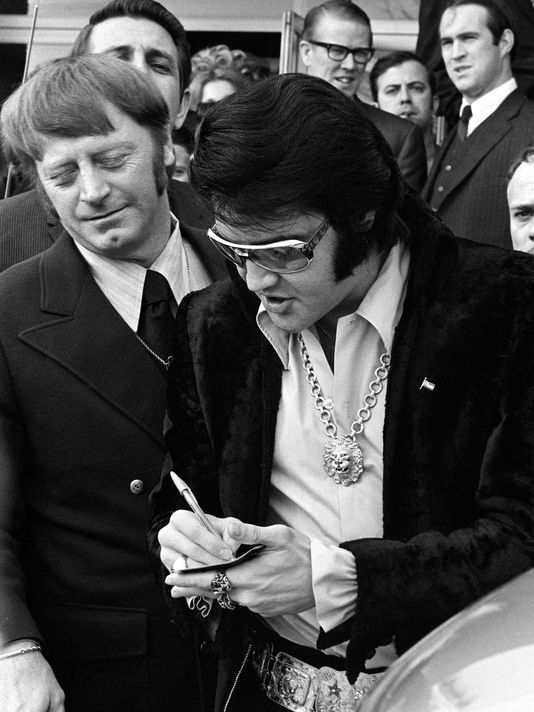MEMPHIS — Red West, the longtime and sometimes critical confidante and bodyguard of Elvis Presley who became a successful film and television actor after the singer's death, died Tuesday nightafter suffering an aortic aneurysm at Baptist Hospital. He was 81.
Born in Bolivar, Tenn., the athletic Robert Gene "Red" West befriended Elvis at Humes High School, where the 6-foot-2 redhead protected the smaller pre-fame Elvis from bullies on at least a couple of occasions, according to Presley lore. He worked for Elvis for some 20 years, occasionally taking small roles in such films as Flaming Star and writing or co-writing such memorable Elvis songs as the 1972 hit Separate Ways, the holiday favorite If Every Day Was Like Christmas and the 1975 masterpiece of infidelity, If You Talk in Your Sleep, recorded at Stax.
West also composed or contributed to songs recorded by other artists, including Ricky Nelson, Pat Boone and Johnny Rivers.
An ex-Marine, Golden Gloves boxer, karate instructor and genuine tough-guy-with-a-heart-of-gold (at least in his later years), West said it was his protective streak that motivated him to co-write Elvis: What Happened?, a tell-all best-seller published only two weeks before Elvis' death on Aug. 16, 1977, that documented the singer’s drug dependency and unhealthy lifestyle. West and his co-authors, fellow “Memphis Mafia” members and Elvis bodyguards Sonny West (a cousin) and David Hebler, assisted by Steve Dunleavy, a journalist, said the book was an attempt to encourage Elvis to give up his dangerous ways, but some outraged fans said the memoir was written out of spite, since the three men only a year earlier had been fired from Elvis’ employ by Elvis’ father, Vernon Presley.
As Elvis' friend, driver and bodyguard, West was among Presley's closest associates during the singer's meteoric rise, Army tour of duty, Hollywood stardom, late 1960s so-called comeback and 1970s decline. West's father, Newton West, died the same day as Elvis' mother, Gladys Presley, which only strengthened the men's bond. When Elvis was in the Army, West traveled to Germany to be nearer the singer, at Presley's request.
Before being fired, West and some of Presley's other bodyguards had received criticism for what the reference book Elvis: His Life from A to Z describes as "heavyhanded tactics" involving "too much physical persuasion," in an attempt "to keep the weirdos away from Elvis." West always defended his work for Elvis, while Vernon Presley said the firings were an attempt to cut Presley's expenses.
Post-Elvis, West became a full-time actor, earning a regular role opposite star Robert Conrad in the late 1970s series Black Sheep Squadron (originally titled Baa Baa Black Sheep), about a squadron of World War II fighter pilots.
West's most famous role was in the 1989 Patrick Swayze cult classic Road House, but major critical acclaim eluded him until late in life, when he landed his first top billing and the first lead role of his career as an old-timer contemplating suicide in the acclaimed independent drama Goodbye Solo (2008), which critic Roger Ebert labeled "a masterwork" and The New York Times called "a near perfect film."
“It took me 59 years to be an overnight success,” West told The Commercial Appeal, in a 2009 interview timed to the local release of the movie
“I started out in this business as a stuntman, and it’s taken its toll on me,” West added. “I’ve had knee replacements, and I’ve got big calcium deposits in my neck from falling on my head so many times. So this is just in time.”
According to The Commercial Appeal, the mature West onscreen was “a sort of deglamorized Robert Mitchum — a weary but tolerant tough guy, with Sad Sack saucer eyes that try but fail to conceal a lifetime of hard-won wisdom and painful lessons." Said Goodbye Solo director Ramin Bahrani: "I wish Clint Eastwood would quit casting himself and realize that this guy's better."
Eastwood never called, but others did. West appeared in such movies as Francis Ford Coppola’s The Rainmaker and Ira Sachs’ Forty Shades of Blues, both shot in Memphis, as well as Robert Altman’s made-in-Mississippi Cookie’s Fortune, Oliver Stone’s Natural Born Killers, Bahrani’s At Any Price (with Dennis Quaid), the horror sequel I Still Know What You Did Last Summer and the true-sports story, Glory Road.
On TV, he could be found in episodes of Mannix, The Six Million Dollar Man, Magnum P.I. and The A-Team. A 2015 appearance in the series Nashville was his final credit.
Related:
In a 2011 episode of Memphis Beat, a TNT crime series set but not shot in Memphis, West played a cancer-stricken inmate serving time for the murder of the father of the series' star, an Elvis-impersonating police detective played by Jason Lee.
Red West and his wife, acting coach Pat West, had celebrated their 56th wedding anniversary on July 1. They met while she was working as a secretary for Elvis, Pat West said Red had complained of pains Sunday afternoon and was taken to Baptist Hospital. Early in the evening, he died after suffering what she described as an abdominal aortic aneurysm.
“From the very start, we had a bond that was just unusual,” Pat West said of her husband. “He was just a straight shooter.”
Pat West said she and her husband usually skipped "Elvis Week," marking the August anniversary of the singer's death, but they had been planning to participate in some activities organized this year by friend and longtime Elvis associate George Klein. "We wanted to go this year, this special year," she said, referring to the 40th anniversary of Presley's Aug. 16, 1977, death.
According to most sources (including Wikipedia and the Internet Movie Database), Red West was born on Nov. 20, 1936, which would make him 80 at the time of his death. But Pat West said his actual birthday was March 8, 1936.
In addition to his wife, West is survived by two sons, actor John Boyd West, of Tampa, and Brent West, of Memphis; a brother, Harold West of Olive Branch, Miss.; and six grandchildren.
Follow John Beifuss on Twitter: @JohnBeifuss


